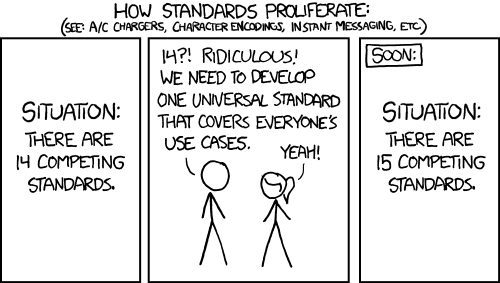Why are there so many programming languages? And why are there still being so many made? I would think you would try to perfect what you have instead of making new ones all the time. I understand you need new languages sometimes like quantumcomputing or some newer tech like that. But for pc you would think there would be some kind of universal language. I’m learning java btw. I like programming languages. But was just wondering.
you would think there would be some kind of universal language

There is an xkcd for everything
I actually don’t think that’s the case for languages. Most languages start out from a desire to do some specific thing better than other languages rather than do everything.
And then there was python. Designed to be designed.
If there was a single language, afterwards the same broken logic would be applied to frameworks and libraries, and we all know how many people removed and whine over Java and it’s extensive standard library.
JavaScript (is the universal language) (is also the answer of why there are so many languages)
Why invent the screwdriver if you have a hammer
What kind of screwdriver though? Torx are superior.
Robertson would like a word.
No doubt they are probably better overall, especially when considering manufacturing. But I swear parts of my house where built with scraps (or the last guy was just a sociopath) and most of the time I encounter them it’s in some rare ass instance and it just pisses me off.
Last time was when servicing my AC I noticed the breaker was bad (ie wouldn’t reset ). So I had to swap it and by code I needed to swap the box it ran on since it was showing signs. Sure enough 1 of 4 screws holding it to the side of the house is a fuckin Robertson head. So I was neck deep in fixing shit and had to stop and go find my random cup of bit heads out in the shop.
Now I just carry a bit if I can remember it. But it’s hard to find screws sometimes so I just don’t use it to avoid exacerbating my own problems.
deleted by creator
In a lot of cases it feels a lot more like my mother in law buying me a new multi-tool every Christmas
Damn…
Some languages have a obligation to support older versions, provide upgrade guides. They have old baggage in the forms of old systems or processes that they can’t just abandon.
Sometimes it’s easier to just start over from a clean slate. Experimenting and seeing how it works. If it fails well you haven’t inconvenienced millions of users.
It’s all about experimenting, trying to see what works, what it’s good with and what it’s not good with. A language like Java can’t just change to experiment things. Some people are also fixed to the style and methodology that Java provides.
Aside from that, hobby languages are just hobbyist stuff.
Quite a few languages that are major players now started as hobby languages.
deleted by creator
I think PHP has a bad rep 'cos it tried to be everything to everyone… if you maintain a certain standard (i.e. always do the same thing the same way) and avoid deviating it’s actually a pretty cool language.
deleted by creator
Removed by mod
I’d call it Paradox Lang, or PL for short. It even has features that are contradictory to each other, you just have to declare which mode you want at the top of every file. Can you imagine. :)
The only feature it doesn’t have is “lightweight and minimal language”.
Such an abomination could be created. Just imagine all the over engineering that would be required.
It would run ANYTHING on ANY platform by incorporating every libc and assembler and VM and dynamic interpreter.
It runs on EVERY platform and thus it can be adequately tested on NO platform.
It should be low-level like assembly and high-level like BASIC, functional, object-oriented, and have weird stuff like traits, concepts, and alien features from Haskell. It must also have both the pointers/references of C++, and the borrow checker of Rust.
Hang on a minute. Isn’t that literally just
RustCrabLang?Rust still lacks OOP (the inheritance/subtyping part of it) though. And some more advanced Haskell features too, like HKT.
I’ll take your word for it about the missing Haskell features, but with regards to inheritance, they deliberate chose to avoid it. They use an alternative model to achieve the same goals inheritance is meant for, but without the issues that come along with it. Their approach is basically a more advanced version of how Go uses interfaces to define shared behaviour.
Ooh rust just became more appealing to me.
It is pretty neat. They’ve made a lot of really interesting design decisions that make for a pretty unique language.
One of its main selling points is how it guarantees memory safety without using a garbage collector. That, plus the fact that it does a shit-ton of compile-time optimizations, actually makes it pretty fast. Like, 80%-90% as fast as C (which is much faster than all the other high-level languages like Java, Go, etc, partly because they do in fact use garbage collectors).
If you want to check it out, I recommend this playlist as a solid intro.
Here is an alternative Piped link(s): https://piped.video/playlist?list=PLai5B987bZ9CoVR-QEIN9foz4QCJ0H2Y8
Piped is a privacy-respecting open-source alternative frontend to YouTube.
I’m open-source, check me out at GitHub.
Oh yeah, I get all of those, because I am a Rust programmer myself who hates OOP. :D
I raised the topic up only because of how people were talking about “the ultimate language with everything”.
Sometimes it’s easier to try a new idea in a new language (e.g. the borrow checker in Rust) rather than trying to shoehorn it into an existing language.
Rust’s borrow checker is a bad example. There are already a few projects that target C++ and support both runtime and compile-time checks, not to mention static code analysis tools that can be added to any project.
Uh, they’re different, though. There is no C++ tool (AFAIK) providing an exhaustive check of ALL the data lifetimes. I even think it’s impossible, because their semantics are really different. Rust is move by default, C++ copy by default; Rust has no inheritance with its constructors, etc.
There is no C++ tool (AFAIK) providing an exhaustive check of ALL the data lifetimes.
Your reply reads like an attempt at moving the goal post.
The initial point was “Sometimes it’s easier to try a new idea in a new language (e.g. the borrow checker in Rust) rather than trying to shoehorn it into an existing language”, to which I pointed the fact that yes it’s indeed possible to “try a new idea” like borrow checking, and it only takes adding a tool that runs in a post-build/unit test step. It’s simpler, easier, and does not force anyone to rewrite projects from scratch.
Claiming “oh but it might not work as well” is not an answer or a refuttal.
Long has man wanted to experiment with as many partners as he can.
Some people consider working on programming languages fun, so they create new ones.
Partly because sometimes a particular language suits a particular problem set.
Partly because people just like writing computer languages.
But mostly because people mistake the fundamental problem of programming, which is programming is really hard. So someone comes along and thinks “Programming is really hard, it must be a problem with the languages available” and sets out to write a computer language that makes programming easy.
But all that happens is they trade one set of difficulties for another set of difficulties. They might succeed in making writing the initial version easier, but make maintaining that code harder. Or they might solve some memory allocation problems, but create performance issues.
Either way, someone will write a language because they think they will help solve the issue of programming being hard, and fail. Because the really hard bit about programming is about understanding everything the program needs to do, in microscopic detail, and translating that into a structure that best fits the problem; not the actual coding itself.
This is why we need low code solutions /s
Think about this: Why are there so many automobiles? And why are so many new models still being made? I would think you would try to perfect what you have instead of making new ones all the time. I understand you need new automobiles sometimes, like construction equipment trucks or some treaded military tanks. But for average daily driver you would think there would be some kind of universal automobile. I drive a Corolla btw. I like automobiles. But was just wondering.
I’m not here to mock you, just providing an analogy. You can deliver just about anything in one language that you can with another. However, like the car, you might need a different type if you want more performance. Maybe you want a fast car. High performance cars often need a lot of attention, they need that premium gas, the mechanics demand higher pay! What if you only care about getting from point A to point B, and you’re more concerned with driving a car that’s cheaper to maintain, maybe there are just more car mechanics for that type of car, and the cost to pay them is cheaper.
A C application that is very well tuned to manage memory and threads in the name of perfect performance will require more time and computer science knowledge to create when compared to a Python script that does the same thing, but in the most basic possible way running on a single CPU, running hundreds of time slower.
Sometimes you need the performance, and often you don’t. Sometimes you need a treaded tank, sometimes you need a NASCAR, and most days the Corolla does just fine, it’ll even let you miss a few oil changes before things get bad.
As to why we don’t perfect what we have now instead of creating more: technology changes, easier to work with abstractions come about, some people enjoy the hobby of creating a language, or maybe a niche language comes about with very specific trade offs for a very specific purpose, no one wants to break backwards compatibility by adding new features and syntax to their language - I’m sure there’s tons more reasons to list.
Think of a programming language as a crutch for the human brain. Processors don’t need it: they don’t have to think about the code, they just execute it. Our mushy human brains need a lot of help, however.
We need to think about things on our own terms. Different programming languages, different APIs that do the same thing, different object models, these all help people tackle new problems, or even just implement solutions in new ways.
Some new languages have a completely different model of execution you may not be familiar with. Imperative languages are what we traditionally think of, because they work most similarly to how processors execute code: the major pattern used to make progress, do work, is to create variables and assign values to them. C, COBOL, BASIC, Pascal, C# (my personal favorite), Javascript, even Rust, are all imperative languages.
But there are also functional languages, like ML or F#. (The latter, I keep installing with Visual Studio but never ever use) The main pattern there is function application. Functions themselves are first order data, and not in a hacky implementation-specific way like you’re passing machine code around. (I’ve only ever used this for grad school homework, never professionally, sadly.)
And declarative languages like Prolog helped give IBM’s Watson its legendary open question answering ability on national TV. When you need a system to be really, actually smart, not just create smart-sounding text convincingly like a generative AI, why not use a language that lets you declare fact tables? (Again, only grad school homework use for me here)
Programming is all about solving problems, and there are so many kinds of problems and so many ways to think about them. I know my own personal pile of gray mush needs all the help it can get.
well … we all know the perfect programming language was created way back in 1960
Ugh, for my work we maintain a software add-in written in Lisp and it’s a nightmare to work on
I thought that link was going to point to this other great programming language
And that link somehow doesn’t open well for me, something about a bracket I believe
And that link somehow doesn’t open well for me (something about a bracket I believe
https://en.wikipedia.org/wiki/Lisp_(programming_language)
(What do (you) mean? ( Lisp certainly has its (downsides) and (upsides)))
(do (What) (you mean))
(has Lisp (and (its downsides) (its upsides)))[Lisp would be a VSO language]
Removed by mod
I would think you would try to perfect what you have instead of making new ones all the time.
Perfecting what you have often leads to a completely different language. See C vs C with classes which ended up being C++.
There is absolutely no problem with creating new languages. These are often designed with specific features in mind, and the success cases often offer features that are in high demand. Take for instance node.js, and how its event loop makes it a near ideal language for network-heavy applications that run on a single thread.
Well I guess I am part of “they” since I have my own programming language pet project. Why did I create it? Because I wanted to, mostly. Sure, there are also some finer language design choices I wanted to choose differently for my preference, but mainly I just wanted to learn how.
I know a handful of languages and I think of them as tools. For example, a flathead screwdriver will work on a phillips screw head (In most cases with some outliers), but a phillips screwdriver might just be better for the job. Same with a wrench and a socket with a ratchet, etc.
When it comes to programming or scripting I approach it in the same way. If I am at work, and I need to automate something quick and dirty, no end user will need to use it, and it is just adjusting data or spitting data back at me, I am probably going to write it in Python.
Or, if I need to make something that an end user is going to interact with, I am probably going to spin up a web server and use the MERN stack to create that.
If I am working at home on a TUI for my favorite application, I am going to use Rust or Python
And if I working on a project that requires me to work with embedded systems, I am probably going to reach for C, maybe C++ depending on the support, and I have in a couple of instances needed to use Assembly.
All this to say, I think that if I had to use Python for all of these, I would be in trouble. Same as if I had to use C++ to accomplish all of the above. Could it be done? Sure. Do I want to do that? Not at all.
let hem keep at it. I haven’t found an easy and verstile language as Python than can compile to byte code and be as fast a C ! I know it is coming anytime now despite having been waiting for over a decade.
I won’t claim it’s as easy as Python, but that’s the rough area that Nim is aiming for. Going from dynamically typed to statically typed is always going to be kind of painful, but I’ve liked the language overall.
Also, we have a Nim community here, if anyone is interested: https://programming.dev/c/nim
🐍 gang











